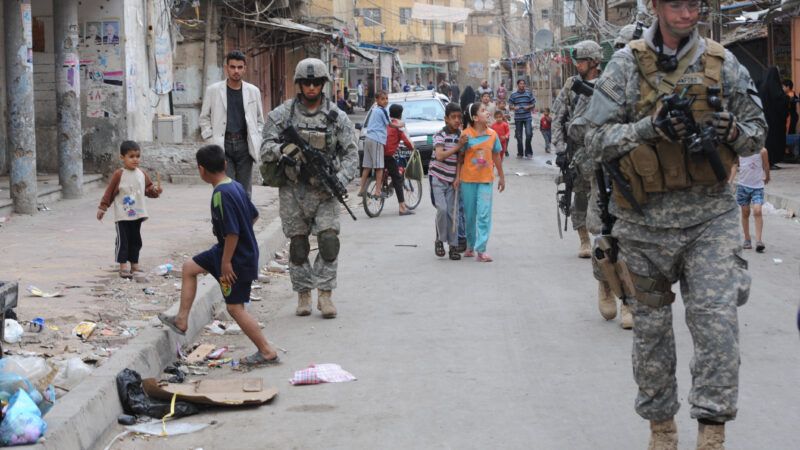U.S. Government: We Didn't Use 'Political Violence' in Iraq
A training slideshow reveals how deluded American leaders continue to be about the Iraq War, more than two decades later.

Why does Washington find it hard to beat Iranian influence? According to the State Department, it's because the U.S. doesn't use "political violence" in Iraq, a country that the U.S. famously invaded and occupied in 2003.
"Iran uses levers of power that we refrain from using (political violence, bribery) and has economic and cultural relationships we cannot replicate," says the State Department's Iraq Familiarization Course slideshow from 2020 and 2021, which it just released under the Freedom of Information Act (FOIA), along with several hundred pages of other training documents.
This message isn't propaganda for public consumption; it is an internal statement of the State Department's line. Part of mandatory training for employees stationed at the U.S. embassy and consulates in Iraq, the slideshow is a window into what the U.S. government tells itself about its role in the Middle East. The line that "we refrain from using political violence" is a sign that American leaders haven't really internalized what a disaster the Iraq War was.
"A stable, sovereign, united Iraq is core to pursuing all our interests in Iraq," the slideshow states. "Optimal approach: Highlight that Iraq's path to stability is through a strong relationship with the U.S., not Iran."
To be clear, the Iranian government has used violence and bribery to influence Iraq, fostering predominantly Shi'ite sectarian militias that run their own protection rackets and assassinate peaceful opponents.
But one of the largest acts of "political violence" in Iraq's history was the U.S. invasion of 2003, when American troops invaded the country, toppled its government, and imposed a new one at gunpoint. (So much for Iraqi sovereignty.) The Iraq Body Count Project has documented at least 120,108 civilian deaths, some of which the U.S. Department of Defense tried to sweep under the rug, as a result of the war from 2003 to 2011.
Although the U.S. military officially handed the reins of security to the new Iraqi government in 2011, American troops returned in 2014, staying indefinitely. And they haven't shied from using threats and violence to reshape Iraqi politics—most famously, by assassinating Iraqi official Abu Mahdi al-Muhandis alongside Iranian Gen. Qassem Soleimani in January 2020.
Bribery was also embedded in the war effort from the beginning. In 2002, during the lead up to the invasion, U.S. special forces teams loaded with millions of dollars infiltrated Iraq in hopes of buying the loyalty of local leaders, The Guardian reported at the time.
During the famous "surge" of 2007, the U.S. military doubled down on this strategy, budgeting $150 million in just one year to pay off Sunni militias. The U.S. Army even published official photos of Iraqi militiamen getting paid to switch sides.

Those taxpayer-funded bribes made a select few people very rich. Tribal sheikhs skimmed around 20 percent of the money intended to pay their militiamen, according to Foreign Affairs. In his forthcoming book, The Fort Bragg Cartel, investigative journalist Seth Harp reports that U.S. troops were convicted of stealing a total of $52 million in Iraq and Afghanistan between 2005 and 2015, and many other thefts were simply never caught.
"The Army would give my husband and his team hundreds of thousands of dollars to pay to get information," the wife of a Special Forces soldier told Harp. "But instead of really giving the money to informants, they brought it home taped to their bodies."
Of course, no government will advertise that it rules through greed and fear. And many other materials in the State Department training, especially those given by outside academics, are more frank about the failures of the U.S. occupation. But American leaders seem to still tell themselves that the Iraq War was a basically innocent, well-intentioned misadventure—and that failure came from not doing enough of the wrong things.
Editor's Note: As of February 29, 2024, commenting privileges on reason.com posts are limited to Reason Plus subscribers. Past commenters are grandfathered in for a temporary period. Subscribe here to preserve your ability to comment. Your Reason Plus subscription also gives you an ad-free version of reason.com, along with full access to the digital edition and archives of Reason magazine. We request that comments be civil and on-topic. We do not moderate or assume any responsibility for comments, which are owned by the readers who post them. Comments do not represent the views of reason.com or Reason Foundation. We reserve the right to delete any comment and ban commenters for any reason at any time. Comments may only be edited within 5 minutes of posting. Report abuses.
Please to post comments


>>Why does Washington find it hard to beat Iranian influence?
Qatar buys a lot of silence.
Obama and Biden also funded them pretty well.
Qatar is throwing dollars at the Trumps!! Btw, Qatar was a rare Bush/Cheney success. Tillerson believed America would import LNG from Qatar…and Trump made Tillerson SoS! Lolololololol!!
I'm shocked! and stunned! Yes shocked! and stunned! Bribery is happening in this establishment?
I thought $100 bills only circulated widely overseas because of the demand by Americans for hotel rooms and meals at fancy restaurants.
Don't even bother trying to convince a war hawk that you have something better. It's impossible for them to learn from experience and their ulterior motives are invincible.
Might behoove Petti to mention that the government toppled was an honest to goodness fascist dictatorship, that would not obey the conditions put upon it after violating international norms. It was not exactly representative of Iraqi sovereignty or peaceful.
What international norms did Iraq violate?
None Molly, none at all.
You know, it's pretty easy to look up the Baath party's history - you don't have to be pro Iraq war to recognize that Hussein was still among the most evil guys in history.
Bush killed more Iraqis than Saddam…and Bush killed more Americans than Osama Bin Laden!! But he loves Jesus and so that makes everything all right!! Wait a second, Netanyahu doesn’t love Jesus…uh oh! 😉